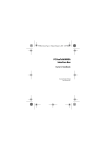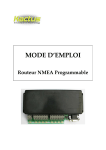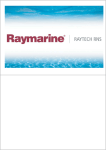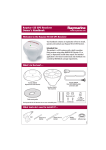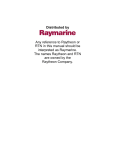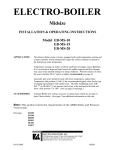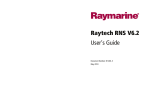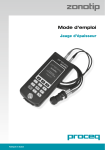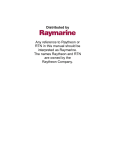Download Raymarine RS232 Installation manual
Transcript
PC/SeaTalk/NMEA Interface Box Owner’s Handbook Document number: 81166-3 Date: 1 February 2002 166_3cov.p65 1 24/01/02, 11:21 Copyright © Raymarine Limited 2002 166_3cov.p65 2 24/01/02, 11:21 Operation and Installation 1 Contents Chapter 1: Introduction .......................................... 3 Chapter 2: Mounting ............................................... 4 Chapter 3: Operation/Wiring ................................. 6 3.1 NMEA Output 6 3.2 NMEA Input 9 3.3 Main Alarm 12 3.4 Connecting to a Personal Computer 14 3.5 Connecting to a PC with RayTech Navigator 19 Chapter 4: Fault Finding ....................................... 20 166_3chs.p65 1 24/01/02, 11:21 2 PC/SeaTalk/NMEA Interface Box EMC Conformance All Raymarine equipment and accessories are designed to the best industry standards for use in the leisure marine environment. The design and manufacture of Raymarine equipment and accessories conform to the appropriate Electromagnetic Compatibility (EMC) standards, but correct installation is required to ensure that performance is not compromised. 166_3chs.p65 2 24/01/02, 11:21 Operation and Installation 3 Chapter 1: Introduction SeaTalk is the language used by Raymarine products to share information. This is unique to Raymarine. The PC/SeaTalk/NMEA Interface, by providing conversion between SeaTalk, RayTech PC and NMEA 0183 data formats, allows operation with other manufacturer's equipment and with PCs. The PC/SeaTalk/NMEA Interface provides: • Connection of SeaTalk to a PC running RayTech • Conversion of NMEA 0183 data format to SeaTalk • Conversion of SeaTalk to NMEA 0183 format • Operation of the Raymarine Main Alarm when an alarm condition exists on the SeaTalk bus 166_3chs.p65 3 24/01/02, 11:21 4 PC/SeaTalk/NMEA Interface Box Chapter 2: Mounting Select a suitable location that is: • away from direct contact with water • clean and grease-free • accessible for cabling • reasonably well protected from physical damage. 1. Once a suitable location has been found, thoroughly clea n the surface with an alcohol based cleaner. 2. Remove the protective backing from the PC/SeaTalk/NMEA Interface box and firmly press onto the mounting surface. D434-2 166_3chs.p65 4 24/01/02, 11:21 Operation and Installation 5 3. Alternatively, the PC/SeaTalk/NMEA Interface box may be attached using the 2 self tapping screws provided. 4. Remove the top of the Interface box by squeezing the lid at each end and pull away from the base. 5. Route all the necessary cables into the Interface box. 6. Connect the wires as described in Chapter 3. Also, secure cables close to the unit. 166_3chs.p65 5 24/01/02, 11:21 6 PC/SeaTalk/NMEA Interface Box Chapter 3: Operation/Wiring EMC Installation Guidelines All Raymarine equipment and accessories are designed to the best industry standards for use in the leisure marine environment. Their design and manufacture conforms to the appropriate Electromagnetic Compatibility (EMC) standards, but correct installation is required to ensure that performance is not compromised. Although every effort has been taken to ensure that they will perform under all conditions, it is important to understand what factors could affect the operation of the product. The guidelines given here describe the conditions for optimum EMC performance, but it is recognised that it may not be possible to meet all of these conditions in all situations. To ensure the best possible conditions for EMC performance within the constraints imposed by any location, always ensure the maximum separation possible between different items of electrical equipment. For optimum EMC performance, it is recommended that wherever possible: • Raymarine equipment and cables connected to it are: • At least 1 m (3 ft) from any equipment transmitting or cables carrying radio signals e.g. VHF radios, cables and antennas. In the case of SSB radios, the distance should be increased to 2 m (7 ft). • More than 2 m (7 ft) from the path of a radar beam. A radar beam can normally be assumed to spread 20 degrees above and below the radiating element. • The equipment is supplied from a separate battery from that used for engine start. Voltage drops below 10 V in the power supply to our products, and starter motor transients, can cause the equipment to reset. This will not 166_3chs.p65 6 24/01/02, 11:21 Operation and Installation 7 damage the equipment, but may cause the loss of some information and may change the operating mode. • Raymarine specified cables are used at all times. Cutting and rejoining these cables can compromise EMC performance and so must be avoided unless doing so is detailed in the installation manual. • If a suppression ferrite is attached to a cable, this ferrite should not be removed. If the ferrite needs to be removed during installation it must be reassembled in the same position. The following illustration shows typical cable suppression ferrites fitted to Raymarine equipment. Always use the ferrites supplied by Raymarine. D3548-2 Connections to Other Equipment If your Raymarine equipment is to be connected to other equipment using a cable not supplied by Raymarine, a suppression ferrite MUST always be fitted to the cable close to the Raymarine unit. EMC Conformance Always check the installation before going to sea to make sure that it is not affected by radio transmissions, engine starting etc. 166_3chs.p65 7 24/01/02, 11:21 8 PC/SeaTalk/NMEA Interface Box 3.1 NMEA Output Provided you have the appropriate SeaTalk instrumentation, the data listed below is transmitted in NMEA 0183 format for use with non-SeaTalk equipment. Note: NMEA is also output in response to NMEA input. 166_3chs.p65 Data Apparent Wind Angle Apparent Wind Speed Bearing to Waypoint Course Over Ground (M) Cross Track Error Date Depth Distance (Log) Distance (Trip) GPS Fix/No Fix GPS HDOP GPS PDOP Transmitted NMEA Header MWV, VWR MWV, VWR BWC, APB VTG APB, XTE ZDA DBT VLW VLW GGA, GLL GSA, GGA GSA Data GPS Satellite Azimuth GPS Satellite Elevation GPS Satellite PR Number GPS Satellite SNR GPS Differential Station ID GPS Differential AGE GPS Number of Satellites NMEA Header GSV GSV GSV GSV GGA GGA GGA 8 24/01/02, 11:21 Operation and Installation GPS Antenna Height GPS Quality Indicator Heading (Magnetic or True) Latitude & Longitude Locked Heading MOB (Cancel) Rudder Angle Speed Over Ground Speed Through water Temperature, Water Time Time Offset True Wind Angle True Wind Direction True Wind Speed Variation Waypoint Capture Velocity Made Good to Wind Waypoint Capture Waypoint Destination No. Waypoint Arrival Alarm Waypoint Distance Waypoint Time To Go 9 GGA GGA HDM, HDG, VHW, HDT GGA, GLL* HSC PNATA RSA VTG VHW MTW ZDA ZTG MWV, VWT MWD MWV, VWT, MWD HDG WPL VPW WPL APB, BWC APB, AAM BWC ZTG * GLL version 1.5 is transmitted if version 1.5 is received via NMEA. If GLL version 2.0 is received via NMEA, GLL version 2.0 will be transmitted. 166_3chs.p65 9 24/01/02, 11:21 10 PC/SeaTalk/NMEA Interface Box Cabling The PC/SeaTalk/NMEA Interface should be connected to SeaTalk and the other manufacturer's equipment as follows: + – IN OUT + – + – OUT + – RS232 SEATALK NMEA NMEA SEATALK ALARM Yellow (Data) Screen (0v) Red (v+) Red (v+) Screen (0v) 5A + - Power D1771-2 166_3chs.p65 10 24/01/02, 11:21 Operation and Installation 11 3.2 NMEA Input The PC/SeaTalk/NMEA Interface can also be used to convert NMEA 0183 data to SeaTalk. NMEA 0183 data is also re-transmitted on NMEA "OUT" in response to NMEA "IN". This allows non-SeaTalk equipment to be connected directly to the SeaTalk bus. Note: Data will not be transmitted to SeaTalk if it is already on present on the SeaTalk bus. Data Apparent Wind Angle Apparent Wind Speed Bearing to Waypoint Course Over Ground (M) Cross Track Error Date Depth Distance (Log) Distance (Trip) GPS Fix/No Fix GPS HDOP GPS PDOP GPS Satellite Azimuth GPS Satellite Elevation GPS Satellite PR Number GPS Satellite SNR GPS Differential Station ID GPS Differential AGE 166_3chs.p65 11 Received NMEA Header MWV, VWR MWV, VWR APB, BWR, BWC, RMB, BER, BEC VTG, VTA, RMC, RMA APB, XTE, APA, RMB, XTR ZDA, RMC DBT, DPT VLW VLW GGA, GSA GGA, GSA GSA GSV GSV GSV GSV GGA GGA 24/01/02, 11:21 12 PC/SeaTalk/NMEA Interface Box Data GPS Number of Satellites GPS Antenna Height GPS Quality Indicator Heading (Magnetic or True) Latitude & Longitude NMEA Header GGA GGA GGA HDM, HDG, VHW, HDT GGA, GLL (inc. Version 1.5) RMC, RMA, IMA, GLP, GOP, GXP, GDP PNATA WPL VTG, VTA, RMC, RMA VHW MTW ZDA, GLL, ZFO, ZTG MWV HDG, HVM, RMC, RMA, HVD APB, BWR, BWC, RMB, BOD, WCV, BER, BEC APB, APA, AAM BWC, BWR RMB, BER, BEC BWC, BWR, BEC, BER WPL PNATA MOB (Cancel) Route Speed Over Ground Speed Through water Temperature, Water Time True Wind Angle Variation Waypoint Destination No. Waypoint Arrival Alarm Waypoint Distance Waypoint Lat & Lon Waypoint Capture Waypoints, last one & next 4 166_3chs.p65 12 24/01/02, 11:21 Operation and Installation 13 Cabling (ST1,2,3000 autopilots) + – IN OUT + – + – OUT + – -+ RS232 SEATALK NMEA Screen (0v) NMEA SEATALK ALARM Yellow (Data) Screen (0v) Red (12V) 5A Fuse D5509-1 166_3chs.p65 13 24/01/02, 11:21 14 PC/SeaTalk/NMEA Interface Box 3.3 Main Alarm The PC/SeaTalk/NMEA Interface can be used to drive the Raymarine Main Alarm (Cat No Z035). This alarm will sound as soon as one of the following alarms is present on the SeaTalk bus: • Deep Depth • Shallow Depth • Autopilot off course • Watch alarm* • Wind shift* • Low battery* • Large Cross Track Error* • No NMEA data* • NMEA Data error* • No autopilot Main power • No autopilot actuator (Drive stopped)* • Radar Guard Zone Alarm • Stern drive auto release • Waypoint advance* • Wind alarm *The Main Alarm will sound 30 seconds after the instrument alarm. This allows the alarm condition to be cancelled and, therefore, avoiding sounding of the main alarm. 166_3chs.p65 14 24/01/02, 11:21 Operation and Installation 15 Cabling The Main Alarm should be wired to the PC/SeaTalk/NMEA Interface as follows: Black Red + – IN OUT + – + – OUT + – RS232 SEATALK NMEA NMEA SEATALK ALARM Main Alarm Z035 Yellow (Data) Screen (0v) Red (v+) Red (v+) Screen (0v) 5A + - Power D1769-2 166_3chs.p65 15 24/01/02, 11:21 16 PC/SeaTalk/NMEA Interface Box 3.4 Connecting a Personal Computer The PC/SeaTalk/NMEA Interface can be used to send or receive SeaTalk and NMEA data to or from a personal computer via the "RS232 OUT and NMEA IN" terminals, as shown in the following illustrations. Red (v+) Transmit + - + – Power IN OUT + – + – OUT + – RS232 SEATALK NMEA Ground NMEA SEATALK ALARM Yellow (Data) Screen (0v) 5A Screen (0v) Red (v+) D1772-2 166_3chs.p65 16 24/01/02, 11:21 Operation and Installation 17 + – IN OUT + – + – OUT + – RS232 SEATALK NMEA NMEA SEATALK ALARM Yellow (Data) Screen (0v) Red (v+) Red (v+) Receive Screen (0v) 5A Ground + - Power D1773-2 166_3chs.p65 17 24/01/02, 11:21 18 PC/SeaTalk/NMEA Interface Box PC Serial Port Connections to NMEA The following diagram shows the pin connections for 25-pin and 9-pin PC serial ports to NMEA. 2 Transmit (from PC) 2 Receive (into PC) 3 Receive (into PC) 3 Transmit (from PC) 5 RS232 Ground 7 RS232 Ground DB25 25-PIN SERIAL CONNECTOR 166_3chs.p65 18 DB9 9-PIN SERIAL CONNECTOR D5903-1 24/01/02, 11:21 Operation and Installation 19 3.5 Connecting to a PC with RayTech Navigator The PC/SeaTalk/NMEA Interface can be used to connect a SeaTalk system to a personal computer equiped with RayTech Navigator charting software. Connection is via the "RS232 OUT and NMEA IN" terminals, as shown in the following illustration. SeaTalk System DEPTH ST40 9-pin Cable (E86001) Direct SeaTalk Interface (E85001) Yellow (Data) +– Screen (0v) Red (v+) IN OUT +– +– OUT +– RS232 SEATALK NMEA Blue NMEA SEATALK ALARM Yellow Green Black D4127_2 166_3chs.p65 19 24/01/02, 11:21 20 PC/SeaTalk/NMEA Interface Box Chapter 4: Fault Finding All Raymarine products are comprehensively tested prior to packing and shipment. In the unlikely event that a fault does occur, the following check list should help cure the problem. Fault Cause Action No operation No power supply Check the SeaTalk bus connectors are correct between the Interface box and the power supply. NMEA data not converted Equipment not set up to Refer to the manufacturers and transmitted onto the transmit correct NMEA operating handbook. SeaTalk bus. sentences. Interface box incorrectly Check connections. wired. Variable information, such as XTE, bearing to waypoint, Lat/Lon already on SeaTalk bus. 166_3chs.p65 Required NMEA information not transmitted from the interface box. Information not present on SeaTalk bus. Connect required SeaTalk Instruments. Main alarm does not sound. 30 second alarm delay applicable. Refer to Section 3.4. 20 24/01/02, 11:21 Operation and Installation 21 Servicing and Safety • Raymarine equipment should be serviced only by authorised Raymarine service technicians. They will ensure that service procedures and replacement parts used will not affect performance. There are no user serviceable parts in any Raymarine product. • Some products generate high voltages, so never handle the cables/ connectors when power is being supplied to the equipment. • When powered up, all electrical equipment produces electromagnetic fields. These can cause adjacent pieces of electrical equipment to interact with one another, with a consequent adverse effect on operation. In order to minimise these effects and enable you to get the best possible performance from your Raymarine equipment, guidelines are given in the installation instructions, to enable you to ensure minimum interaction between different items of equipment, i.e. ensure optimum Electromagnetic Compatibility (EMC). • Always report any EMC-related problem to your nearest Raymarine dealer. We use such information to improve our quality standards. • In some installations, it may not be possible to prevent the equipment from being affected by external influences. In general this will not damage the equipment but it can lead to spurious resetting action, or momentarily may result in faulty operation. 166_3chs.p65 21 24/01/02, 11:21 22 166_3chs.p65 PC/SeaTalk/NMEA Interface Box 22 24/01/02, 11:21
























